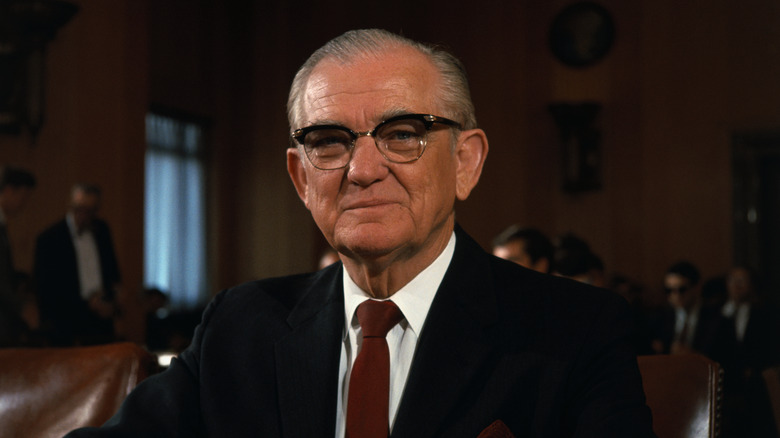Who Was John C. Stennis And Why Does He Have An Aircraft Carrier Named After Him?
Nuclear aircraft carriers only need to refuel once or twice during their service for the United States Navy and that's just what the U.S.S. John C. Stennis (CVN-74), a Nimitz-class supercarrier, is undergoing at the moment. Refueling along with maintenance and modernization has been ongoing since 2021 and won't finish until 2026. Senator John Cornelius Stennis, the carrier's namesake, hailed from Mississippi and served in the United States Senate for nearly 42 years (1947 to 1989), one of the longest serving members. Above all things, he wanted a strong military, which eventually earned him the title "Father of America's Modern Navy."
His long service as a senator coupled with his stalwart effort to bolster the U.S. military garnered recognition from President Ronald Reagan. In 1988, before President Reagan was out of office, he announced that CVN-74 was going to bear the senator's name. It was the first and only time a senator has had a nuclear aircraft carrier named after them. Before his time as a senator, Stennis graduated from Mississippi State University in 1923 with his undergraduate and went onto the University of Virginia for law school and graduated in 1928.
The Mississippi born legislator practiced law between 1932 and 1937 as a prosecutor for the state's 16th district and became a circuit judge for the same district. There, he served as a judge until 1947 when he won the special election after Senator Theodore G. Bilbo passed away. John Cornelius Stennis would go on to leave behind a rather divisive legacy.
The senator's legacy
After winning the special election that placed him in the country's capital, long before he had a nuclear aircraft carrier named after him, he made many constituents, specifically farmers, happy by passing a law that paved rural roads throughout Mississippi. It got the farmers "out of the mud," as he put it. He eventually found himself on multiple senate committees, such as the Standards and Conduct Committee, Appropriations Committee, and the Armed Services Committee. He wrote the Senate's first code of ethics as the chair of the Standards and Conduct Committee, a committee that investigated alleged unethical behavior exhibited by senators.
It was the Armed Services and Appropriations Committees where he made quite a name for himself and earned friends on both sides of the aisle. His time on the Armed Services Committee earned him his moniker and eventual name on one of the largest aircraft carriers in the world. He pushed for modernization of the U.S. Navy's carrier fleet and aircraft, as well as limiting the power the executive branch had when it came to entering a war.
However, when it came to civil rights during the '60s, his record, critics would say, was less than stellar. He regularly condemned physical acts of hate from certain groups, but kept his name off any bills that would protect human rights for African-Americans. Some might say this was out of fear of losing his seat in the Senate, while others would argue it reflected his personal beliefs.
Critics want the carrier's name changed
Having a nuclear aircraft carrier, or any military vessel for that matter, named after you is a great honor that should be reserved for the most noble of people. Which is why Lieutenant Commander Reuben Keith Green, US Navy (Retired) made the case in 2020 that the U.S.S. John C. Stennis should bear a new name. No matter how accomplished Senator Stennis was, it's difficult to deny the senator's voting record. John C. Stennis was a segregationist who stood in the way of civil rights in America.
Stennis signed the "Southern Manifesto," which argued that Brown v Board of Education of Topeka was an abuse of judicial power. According to Green, former Chief of Naval Operations Admiral Elmo Zumwalt, the USS Zumwalt destroyer's namesake, wrote a memoir where he recounts a meeting with Stennis. In this meeting, the senator said, "Blacks had come down from the trees a lot later than we did." There are a few other texts, such as Jesse Curtis's thesis "Awakening the Nation: Mississippi Senator John C. Stennis, the White Countermovement, and the Rise of Colorblind Conservatism, 1947–1964" that highlight the senator's problematic ideology.
NPR heard from several members of the U.S. armed forces, current and retired, in March 2024, who stand by Green's push for the Navy to rename the carrier. With evidence of Stennis supporting wholly Caucasian units in the military, a principle that the United States military isn't supposed to stand for, it's difficult to argue against Green's petition.


